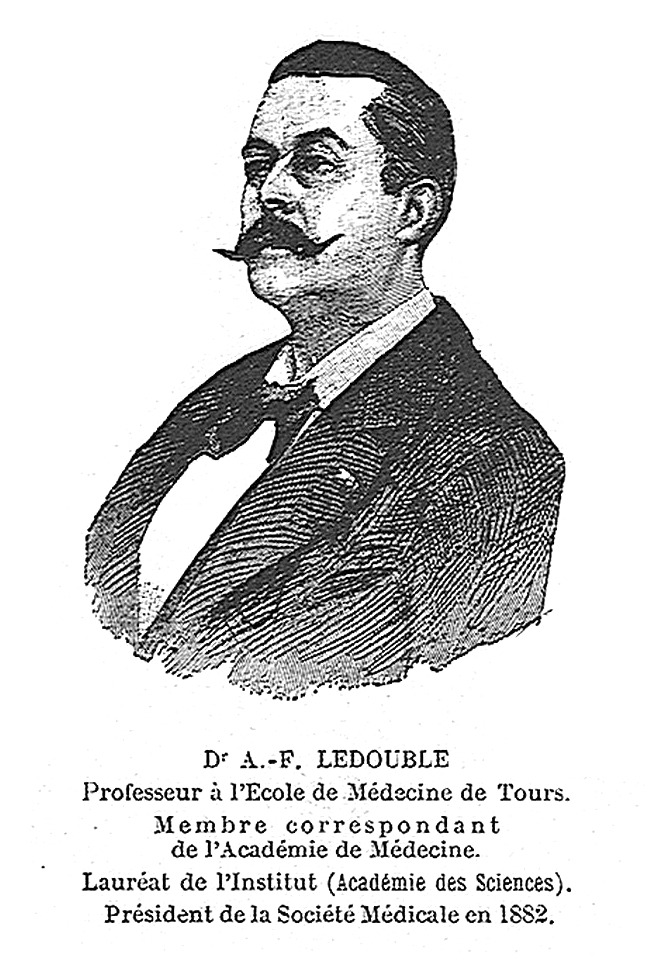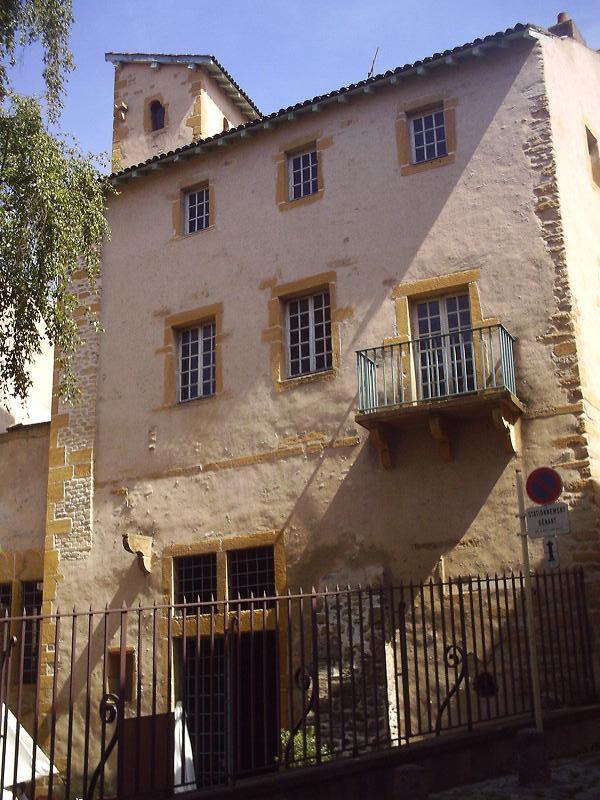|
Anatole Félix Le Double
Félix Odoart Anatole Pierre Xavier Le Double (14 August 1848 – 22 October 1913) was a French anatomist and physician. He studied and taught comparative anatomy and took a special interest in anthropology and differences in anatomy and took an evolutionary view on these variations. Le Double was born in Rocroi, Ardennes where his father was owner of the insurance company Compagnie du Soleil. He studied at the lycaeum in Honfleur where his family had moved to and then went to study medicine in Paris. He graduated with medals and honours and served in the Franco-Prussian War. He then worked in Paris and submitted a thesis in 1876 on occlusion caused by urogenital fistulas. He became a surgeon at the Hospice Général of Tours, and then a professor of the medical faculty of Tours. Le Double took a special interest in comparative anatomy and in anthropology. He took a special interest in anatomical variations within humans. He was one of the first French researchers to promote the ... [...More Info...] [...Related Items...] OR: [Wikipedia] [Google] [Baidu] |
Rocroi
Rocroi () is a commune in the Ardennes department in northern France. The central area is a notable surviving example of a bastion fort. Population History Rocroi was fortified by Francis I of France and expanded by Henry II of France. Because of its strategic location in the north of France it changed hands a number of times during wars. It is best known for the Battle of Rocroi in 1643. In the 1670s the fortifications were re-modelled by the French engineer Vauban. Réseau des sites majeurs de Vauban In 1815, two months after the , the town was taken by ... [...More Info...] [...Related Items...] OR: [Wikipedia] [Google] [Baidu] |
Honfleur
Honfleur () is a commune in the Calvados department in northwestern France. It is located on the southern bank of the estuary of the Seine across from le Havre and very close to the exit of the Pont de Normandie. The people that inhabit Honfleur are called ''Honfleurais.'' It is especially known for its old port, characterized by its houses with slate-covered frontages, painted frequently by artists. There have been many notable artists, including, Gustave Courbet, Eugène Boudin, Claude Monet and Johan Jongkind, forming the ''école de Honfleur'' (Honfleur school) which contributed to the appearance of the Impressionist movement. The Sainte-Catherine church, which has a bell tower separate from the principal building, is the largest wooden church in France. History The first written record of Honfleur is a reference by Richard III, Duke of Normandy, in 1027. By the middle of the 12th century, the city represented a significant transit point for goods from Rouen to Engla ... [...More Info...] [...Related Items...] OR: [Wikipedia] [Google] [Baidu] |
François Rabelais
François Rabelais ( , , ; born between 1483 and 1494; died 1553) was a French Renaissance writer, physician, Renaissance humanist, monk and Greek scholar. He is primarily known as a writer of satire, of the grotesque, and of bawdy jokes and songs. Ecclesiastical yet anticlerical, Christian yet considered by some as a free thinker, a doctor yet having the image of a '' bon vivant'', the multiple facets of his personality sometimes seem contradictory. Caught up in the religious and political turmoil of the Reformation, Rabelais showed himself to be both sensitive and critical towards the great questions of his time. Subsequently, the views of his life and work have evolved according to the times and currents of thought. An admirer of Erasmus, through parody and satire Rabelais fought for tolerance, peace, an evangelical faith, and a return to the knowledge of ancient Greco-Romans to dispel the "Gothic darkness" that characterized the Middle Ages. He took up the theses of P ... [...More Info...] [...Related Items...] OR: [Wikipedia] [Google] [Baidu] |
1848 Births
1848 is historically famous for the wave of revolutions, a series of widespread struggles for more liberal governments, which broke out from Brazil to Hungary; although most failed in their immediate aims, they significantly altered the political and philosophical landscape and had major ramifications throughout the rest of the century. Ereignisblatt aus den revolutionären Märztagen 18.-19. März 1848 mit einer Barrikadenszene aus der Breiten Strasse, Berlin 01.jpg, Cheering revolutionaries in Berlin, on March 19, 1848, with the new flag of Germany Lar9 philippo 001z.jpg, French Revolution of 1848: Republican riots forced King Louis-Philippe to abdicate Zeitgenössige Lithografie der Nationalversammlung in der Paulskirche.jpg, German National Assembly's meeting in St. Paul's Church Pákozdi csata.jpg, Battle of Pákozd in the Hungarian Revolution of 1848 Events January–March * January 3 – Joseph Jenkins Roberts is sworn in, as the first president of the inde ... [...More Info...] [...Related Items...] OR: [Wikipedia] [Google] [Baidu] |
1913 Deaths
Events January * January 5 – First Balkan War: Battle of Lemnos – Greek admiral Pavlos Kountouriotis forces the Turkish fleet to retreat to its base within the Dardanelles, from which it will not venture for the rest of the war. * January 13 – Edward Carson founds the (first) Ulster Volunteer Force, by unifying several existing loyalist militias to resist home rule for Ireland. * January 23 – 1913 Ottoman coup d'état: Ismail Enver comes to power. * January – Stalin (whose first article using this name is published this month) travels to Vienna to carry out research. Until he leaves on February 16 the city is home simultaneously to him, Hitler, Trotsky and Tito alongside Berg, Freud and Jung and Ludwig and Paul Wittgenstein. February * February 1 – New York City's Grand Central Terminal, having been rebuilt, reopens as the world's largest railroad station. * February 3 – The 16th Amendment to the United States Cons ... [...More Info...] [...Related Items...] OR: [Wikipedia] [Google] [Baidu] |
French Anatomists
French (french: français(e), link=no) may refer to: * Something of, from, or related to France ** French language, which originated in France, and its various dialects and accents ** French people, a nation and ethnic group identified with France ** French cuisine, cooking traditions and practices Fortnite French places Arts and media * The French (band), a British rock band * "French" (episode), a live-action episode of ''The Super Mario Bros. Super Show!'' * ''Française'' (film), 2008 * French Stewart (born 1964), American actor Other uses * French (surname), a surname (including a list of people with the name) * French (tunic), a particular type of military jacket or tunic used in the Russian Empire and Soviet Union * French's, an American brand of mustard condiment * French catheter scale, a unit of measurement of diameter * French Defence, a chess opening * French kiss, a type of kiss involving the tongue See also * France (other) * Franch, a surname * Frenc ... [...More Info...] [...Related Items...] OR: [Wikipedia] [Google] [Baidu] |
People From Ardennes (department)
A person ( : people) is a being that has certain capacities or attributes such as reason, morality, consciousness or self-consciousness, and being a part of a culturally established form of social relations such as kinship, ownership of property, or legal responsibility. The defining features of personhood and, consequently, what makes a person count as a person, differ widely among cultures and contexts. In addition to the question of personhood, of what makes a being count as a person to begin with, there are further questions about personal identity and self: both about what makes any particular person that particular person instead of another, and about what makes a person at one time the same person as they were or will be at another time despite any intervening changes. The plural form "people" is often used to refer to an entire nation or ethnic group (as in "a people"), and this was the original meaning of the word; it subsequently acquired its use as a plural form of ... [...More Info...] [...Related Items...] OR: [Wikipedia] [Google] [Baidu] |
University Of Paris Alumni
A university () is an institution of higher (or tertiary) education and research which awards academic degrees in several academic disciplines. Universities typically offer both undergraduate and postgraduate programs. In the United States, the designation is reserved for colleges that have a graduate school. The word ''university'' is derived from the Latin ''universitas magistrorum et scholarium'', which roughly means "community of teachers and scholars". The first universities were created in Europe by Catholic Church monks. The University of Bologna (''Università di Bologna''), founded in 1088, is the first university in the sense of: *Being a high degree-awarding institute. *Having independence from the ecclesiastic schools, although conducted by both clergy and non-clergy. *Using the word ''universitas'' (which was coined at its foundation). *Issuing secular and non-secular degrees: grammar, rhetoric, logic, theology, canon law, notarial law.Hunt Janin: "The university ... [...More Info...] [...Related Items...] OR: [Wikipedia] [Google] [Baidu] |





_1938.jpg)